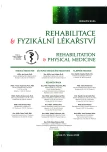-
Medical journals
- Career
The Influence of an Oncological Disease of the Tactile System in Children
Authors: V. Musilová; T. Vyhlídal
Authors‘ workplace: Fakulta tělesné kultury, katedra aplikovaných pohybových aktivit, Univerzita Palackého v Olomouci
Published in: Rehabil. fyz. Lék., 27, 2020, No. 1, pp. 3-8.
Category: Original Papers
Overview
Tactile system is important for human emotional stability, for good motor planning, fine motor skills, mouth motor, and also for good social relationships, the ability of learning, discovering and feeling good in your own body. The article is about tactile system of children with oncological disease which have undergone the oncological treatment. Does the treatment have some side effect on tactile system? Research includes 30 respondents divided into two groups. The focus group and the control group. The focus group includes children with oncological disease which have undergone the oncological treatment and the control group includes healthy children without any physical or psychical diseases. The aim of the research was to find out whether the children with oncological disease have some problems with their tactile system. The condition of tactile system was detected by short version of questionnaire “Short Sensory Profile “, written by Winnie Dunn (1999). This questionnaire was filled out by parents of 30 children. The results of the questionnaire show that children with oncological disease which have undergone the oncological treatment don´t have some significant deviation in their tactile system, because in two of three categories were their answers in the part of physiological response. In the third category were their answers in part of unequivocal deviation. So we should offer them so many tactile stimulation so it´s possible.
Keywords:
children oncology – tactile system – sensory integration
Sources
1. AYRES, A. J.: Sensory integration and the child (Understanding hoden sensory challenges) (6th ed.). United States of America: Wps, 2005.
2. BAJČIOVÁ, V.: Dětská onkologie. In J. Vorlíček (Ed.), Onkologie, (s. 202-206). Praha, Triton, 2012.
3. BLOOM, J. R., PETERSEN, D. M., KANG, S. H.: Multi-dimensional quality of life among long-term (5+ years) adult cancer survivors. Psycho-Oncology, 2007.
4. Institut biostatistiky a analýz Masarykovy univerzity (2018). Reporting. Retrieved 12. 6. 2018 from the World Wide Web: http://detskaonkologie.registry.cz/index.php?pg=reporting.
5. KOUTECKÝ, J., KABÍČKOVÁ, E., STARÝ, J.: Dětská onkologie pro praxi. Praha, Triton, 2002.
6. KREJČÍŘOVÁ, D., LANGMEIER, J.: Vývojová psychologie. (2nd ed.). Praha: Grada, 2007.
7. NASS, S., PATLAK, M.: Comprehensive cancer care for children and their families: summary of a joint workshop by the Institute of Medicine and the American Cancer Society. Washington, D.C.: National Academies Press, 2015.
8. VYHLÍDAL, T., JEŠINA, O. et al.: Pohybové aktivity v dětské onkologii. Praha. Powerprint, 2014.
Labels
Physiotherapist, university degree Rehabilitation Sports medicine
Article was published inRehabilitation & Physical Medicine

2020 Issue 1-
All articles in this issue
- The Influence of an Oncological Disease of the Tactile System in Children
- Possibilities of Biomechanical Analysis of Spontaneous Locomotor Activity in Newborn Children
- Impact of High and Moderate Intensity of Physical Activity on the Prevalence of Stress Urinary Incontinence in Sportswomen
- Impedance Therapy in Rehabilitation of Degenerative Disease of the Spine
- The Use of Cognitive Dual Tasks in Evaluating the Level of Postural Control
- Influence of Lymphatic Drainage on the Fracture of Ankle Joint Solved by Osteosynthesis
- Effect of Prosthesis on Body Posture and Postural Stability in Upper Limb Amputees
- Occupational Intervention with Tobii PCEye Plus Eye Navigation for Clients with Pervasive Developmental Disorder
- Zdeněk Třískala, Dobroslava Jandová a kolektiv: Medicína přírodních léčivých zdrojů Minerální vody
- Rehabilitation & Physical Medicine
- Journal archive
- Current issue
- Online only
- About the journal
Most read in this issue- Impedance Therapy in Rehabilitation of Degenerative Disease of the Spine
- Influence of Lymphatic Drainage on the Fracture of Ankle Joint Solved by Osteosynthesis
- The Use of Cognitive Dual Tasks in Evaluating the Level of Postural Control
- Effect of Prosthesis on Body Posture and Postural Stability in Upper Limb Amputees
Login#ADS_BOTTOM_SCRIPTS#Forgotten passwordEnter the email address that you registered with. We will send you instructions on how to set a new password.
- Career

